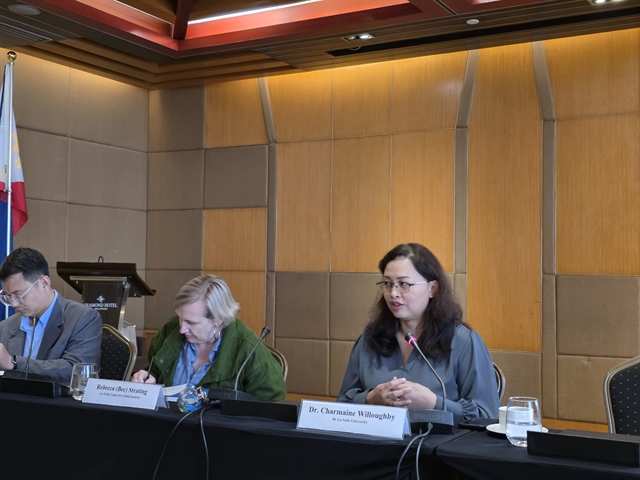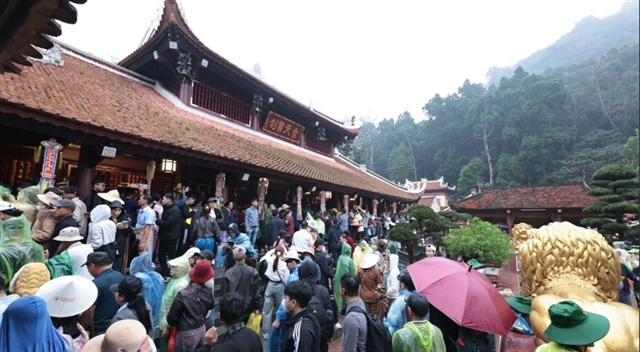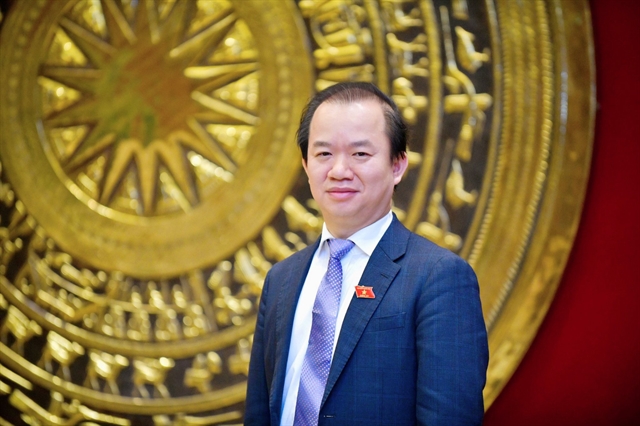 Opinion
Opinion


|
| Associate Professor Dr. Bùi Hoài Sơn, a Permanent Member of the Cultural and Educational Committee of the National Assembly. Photo quochoi.vn |
In the ongoing efforts to bolster the nation's soft power and amplify Việt Nam’s presence and reputation globally, Associate Professor Dr. Bùi Hoài Sơn, a Permanent Member of the Cultural and Educational Committee of the National Assembly, emphasises the need for the diplomatic sector to vigorously enhance the promotion of Việt Nam’s culture through diplomacy in the years ahead.
Could you explain the importance of cultural diplomacy for the country's politics?
Cultural diplomacy holds significant importance for a nation's politics on various fronts. Firstly, in the broader spectrum of human existence and international relations, culture serves as a vital conduit. It operates as a form of soft power, exerting a profound and enduring influence across generations. In the context of globalisation, cultural diplomacy assumes heightened importance. While countries navigate the currents of globalisation, preserving their unique cultural identities becomes paramount. This preservation not only fosters national pride but also facilitates the achievement of national development goals by fostering mutual understanding and respect.
Cultural diplomacy is integral to Việt Nam's foreign policy framework, standing alongside political and economic diplomacy as one of its three pillars. The adaptability and flexibility of cultural diplomacy enable it to effectively complement these pillars, forming a comprehensive foreign policy strategy. Particularly in today's era of deep and comprehensive integration, global appreciation of Việt Nam's culture, people and policies is essential for enhancing the nation's international standing and image. Therefore, cultural diplomacy plays a crucial role in advancing Việt Nam's political objectives on the world stage.
Indeed, cultural diplomacy has played a pivotal role in Việt Nam's political landscape, contributing significantly to the nation's modernisation, cultural preservation, and integration of international influences. Activities such as international cultural exchanges, hosting cultural events abroad, and organising Việt Nam Days overseas have been actively pursued and highly valued by both the Party and the state. These endeavours have not only promoted Việt Nam's image but also elevated its standing on the global stage.
The growing interest and understanding of Việt Nam from countries worldwide serve as a testament to the effectiveness of cultural diplomacy efforts. Recognising its importance, the organisation and implementation of cultural diplomacy strategies have become a focal point of concern raised by National Assembly delegates.
Minister of Foreign Affairs Bùi Thanh Sơn emphasised the importance of cultural diplomacy activities in enhancing the promotion of the country's image and its people to the world. What significance does this hold? How do you assess the cultural promotion efforts of the country in recent years?
Cultural diplomacy serves as a crucial instrument for fostering mutual understanding and strengthening political relations with other nations, thereby contributing to global peace, stability and elevating Việt Nam's international standing. Minister Bùi Thanh Sơn's acknowledgement underscores the profound significance of such endeavours.
In recent years, Việt Nam has made commendable strides in cultural promotion, spreading soft power, instilling confidence in Vietnamese culture and its people and establishing brands for Vietnamese cultural and artistic products. These efforts have been instrumental in supporting the country's socio-economic development and enhancing its global reputation. Through cultural diplomacy, Việt Nam has effectively showcased its rich cultural heritage and hospitable people to the world, fostering goodwill and forging positive relations with other nations. These initiatives have laid a solid foundation for international cooperation and trade, while also attracting investment and stimulating economic growth.
The dissemination of soft power enables Việt Nam to actively engage in international forums and address pressing global issues such as climate change, sustainable development and global security. By doing so, Việt Nam contributes to the establishment of a peaceful and prosperous world.
Simultaneously, it cultivates interest in tourism and exploration of Việt Nam's landscapes, culture and people, fostering the growth of the tourism industry and spreading benefits across various economic and social sectors. Additionally, it plays a crucial role in enhancing the economic and cultural development of localities and tourist destinations.
Over the years, promoting Vietnamese culture has emerged as a pivotal task, evident in numerous congresses, resolutions and policy documents. Notably, in the Cultural Diplomacy Strategy until 2030, cultural promotion stands as a key focus. The objectives outlined therein emphasise the promotion of cultural values, the country's image, and the Vietnamese people. This involves highlighting the values and ideologies of President Hồ Chí Minh and UNESCO-honoured figures, nurturing the development of the cultural industry, expanding the market for Vietnamese goods and services and establishing Việt Nam as a compelling destination for international cultural exchanges while promoting local brands.
Assessing the promotion of the country's culture in recent years, we observe significant efforts from various ministries, sectors and localities. Through diverse diplomatic channels and participation in numerous domestic and international events, these efforts have rendered the image of Việt Nam and its people more familiar and appealing to international audiences, thereby providing additional resources for the country's development.
In my view, the foremost challenge lies in the realm of resources. We face shortages in terms of financial, infrastructural, and human capital resources for cultural promotion endeavours. Financially, the current budget allocation mechanism presents numerous hurdles for organising cultural promotion activities. Notably, major events like the World Expo encounter obstacles and even smaller-scale initiatives such as inbound and outbound delegations face financial regulation issues. External resource mobilisation also encounters challenges due to constraints within public-private cooperation mechanisms or the management and utilisation of public assets.
In terms of infrastructure, despite concerted efforts, cultural and sports facilities still lack the requisite conditions to host large-scale events in Việt Nam. This deficiency prevents Việt Nam from becoming a priority or optimal destination for major cultural and artistic events worldwide, thereby impeding our ability to promote our culture within our own borders.
We face a shortage of cultural and tourism promotion centres abroad. Despite setting targets, for many years, we have only established Việt Nam Cultural Centres in France and Laos. Tourism promotion centres encounter even greater difficulties in this regard.
Human resources indeed constitute the most critical aspect. We must acknowledge that the workforce involved in cultural promotion across various ministries, sectors, and localities has not fully met the demands of this vital mission. Our compensation policies lack attractiveness, failing to draw in talented individuals to engage in promotional activities. These challenges, coupled with issues like inadequate coordination in promotional strategies or other policy and mechanism-related matters, are paramount. It is only by surmounting these obstacles that our cultural promotion endeavours can yield the desirable outcomes we aspire to achieve.
What specific activities should the diplomatic sector prioritise in order to effectively promote Việt Nam’s image and elevate its position among international friends?
To effectively promote the country's image and enhance Việt Nam’s standing in the eyes of international friends, the diplomatic sector should prioritise several key activities in the near future.
It is crucial to ensure the effective implementation of both the Cultural Diplomacy Strategy and the Foreign Cultural Strategy until 2030. This involves building and refining mechanisms and policies to support the promotion of national art and the export of cultural products abroad. By doing so, we can proactively expand cultural cooperation with other countries, diversify forms of cultural promotion and deepen international cultural relations to achieve practical effectiveness. Selectively absorbing the world's cultural essence will enrich our national culture and strengthen our cultural diplomacy efforts.
Additionally, we must further harness the talents and dedication of Vietnamese intellectuals and artists residing abroad to promote the country's culture. They can serve as bridges in promoting the image of Việt Nam, its culture, and its people on the global stage. Establishing several Việt Nam Cultural Centres abroad and translation and cultural promotion centres for Việt Nam will facilitate these efforts.
All these activities necessitate collaborative efforts from various sectors of society, including the state, enterprises, private individuals, both domestically and internationally. Through collective action, we can confidently envision a bright future for cultural promotion activities, contributing to the realisation of our aspirations to build a prosperous and happy country. VNS




